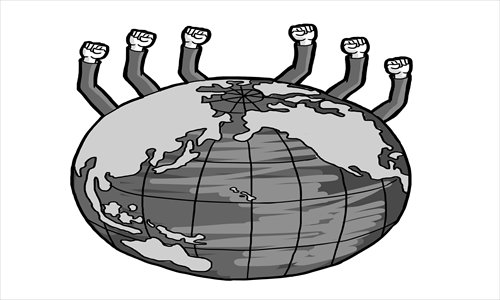Public needs say in decisions about local environment

Just as the protests over a molybdenum copper plant in Shifang, Sichuan Province, were starting to ease, another mass incident over the construction of a waste water disposal project for a paper factory in Qidong, Jiangsu Province drew huge public attention.
The two incidents share many similarities, such as the Not In My Back Yard (NIMBY) syndrome, which commonly refers to public opposition to a proposal for a new development that may be socially necessary but is close to locals' homes and may impact their lives.
In both cases, the locals were clear that they firmly oppose projects that might ruin the local environment. There were physical clashes in both spots. In Shifang, local police used non-lethal but heavy-handed force, while some members of the crowd destroyed public property in both cases.
After the incidents broke out, both governments' way of handling them was also quite similar. Both authorities made rapid pledges that they would stop the projects. Moreover, in their official announcements, both used the term "permanently." This strong wording was aimed at convincing the public to go home to avoid further escalation.
But since residents in Dalian, Liaoning Province took a stand against the PX project planned for the city in August last year, a worrisome tendency has started to emerge. Following local heads' pledge to stop the project immediately that day, the policymakers in both Shifang and Nantong, which administrates Qidong, adapted this tactic in handling their own incidents.
But while doing so may ease the public's dissatisfaction temporarily, it exposed a major flaw in the government's policymaking process. This is not a new issue, but no significant improvement has been made to address this problem of reckless decision-making.
NIMBY cases will continue to rise in the future as the Chinese public becomes more civic-minded. Projects that embody conflicts between economic development and the preservation of the local environment will constantly be challenged by public opinion.
Yet current mechanisms have proved unable to solve these disputes. A "permanent suspension" may come in handy in some cases, but it is mostly driven by the mentality of placing stability above all and can bring long-term damage to both the government's credibility and investor's confidence.
The government should open up its policymaking process for public participation, building up a representative system that allows the citizens to approve its projects. A good example can be found in Panyu, Guangdong Province, where local residents have also been taking a stand against a garbage incinerator project. But unlike what happened in Shifang and Qidong, the petition in Panyu is now undergoing a positive transition from a traditional street demonstration to a professional lobby.
This is because local residents and the government have established a representative mechanism that enables effective public participation in policymaking. For instance, local residents elect their representatives with professional knowledge on this issue. The representatives would then be invited to bring the issue to the government's work conference for negotiation. The public will also be informed of this process.
The fate of local projects shouldn't depend on the whim of either local leaders or angry protestors, but experts and professionals. The government should stop shouldering all the responsibilities and instead invite the public to help. This actually can be beneficial to the government as it won't have to take all the blame if a project goes wrong.
Sharing responsibilities with the public will also help boost the development of a civil society, as people will become more capable in managing their own community's affairs.
The author is a media commentator based in Guangzhou. opinion@globaltimes.com.cn
Fragmented information puts angry crowds out on street